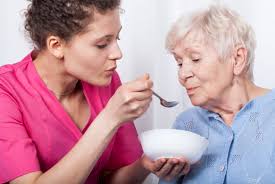
For seniors to stay strong, healthy all through their years and to improve on or recover from any medical condition, they surely need enough nutrients from the foods they eat. This is why it becomes a big problem for caregivers when their loved ones refuse to eat because they have lost their appetite. Notwithstanding, loss of appetite is a natural part of aging for some seniors, it can still be very disturbing to see a loved one not feeding well. It is of great importance that caregivers should try to know why seniors lose their appetite and how to treat loss of appetite since they need to get enough nutrients to stay healthy.
WHY DO SENIORS LOSE THEIR APPETITE?
There are many reasons why some seniors lose their appetite or refuse to eat. The first and most important thing is to be sure if the reasons are due to serious health conditions, medication side effects, or dental problems. Here are some of the reasons why seniors lose their appetite :
-
Dehydration
-
Taste bud change
-
Sensitivity to smells
-
Slowing metabolism
-
Depression or Anxiety
-
Difficulty chewing or swallowing
-
Difficulty eating independently
-
Side effects from medication, like dry mouth
-
Dental problems, including poor-fitting dentures
HOW DO YOU STIMULATE APPETITE IN THE SENIORS?
Despite the fact that loss of appetite in seniors can be part of the aging process, caregivers will still have to find a way to ensure that their loved ones get the nutrition they need to stay healthy. It may seem like appetite just comes and goes inexplicably, but there are things caregivers can do to help their loved ones increase their appetite. Here are some tips caregivers can employ to stimulate appetite in seniors:
-
You should create a meal schedule for your loved one. This will encourage your loved one to start eating at the same time every day and improve his or her eating habit. This can train the Your loved one’s mind and body will be trained to expect and even look forward to an upcoming meal at stipulated times daily.
-
You should not serve your loved one with a big portion of food. Placing a big portion of food before seniors, may be overwhelming for them. Instead, ensure to serve your loved one’s smaller portions of foods but with high contents of nutrients that will help to improve and maintain your loved one’s health conditions.
-
You should help your loved one create and maintain social connections and relationships. When seniors are left alone in their world, depression can set in. Depression and loneliness contribute greatly to loss of appetite in the seniors. But if seniors are able to meet with families and friends especially during mealtime, mealtime seems like an interesting activity to them and this can help to stimulate their appetite.
-
You can allow your loved one to make his or her choice . You can ask to know the foods that stimulate their appetites. Also, to make your loved ones feel more interested, get them involved in the planning of their meals and preparations of the meal.
-
In case your loved one is experiencing dry mouth, you can help him or her fight it. Dry mouth is a common side effect of medication. It can also contribute to loss of appetite in a senior. Suggest that your loved one use a mouth rinse, brush his or her teeth or chew sugarless gum before a meal to treat dry mouth and help stimulate their appetite.
-
You can encourage your loved one to eat healthy snacks. Some seniors prefer to feed on light foods throughout the day. Ensure to provide your loved one with a variety of easy-to-eat, healthy snacks regularly.
-
You can talk to your loved one’s doctor about prescribing an appetite stimulant. Loss of appetite can lead to unplanned weight loss and malnutrition, which increases the risk for poor health conditions. If your loved one’s health is at risk and other attempts to improve his or her appetite have failed, a prescription appetite stimulant may help.
CONCLUSION
A reduced appetite in an elderly loved one can take an emotional toll on a caregiver. However, there are a variety of reasons for appetite loss in the seniors, known or unknown, something has to be done. Loss of appetite in seniors should not be ignored as it may be a sign of an underlying health issue. Healthy nutrition is essential for people of all age groups, senior citizens especially. Families and caregivers of seniors are thereby advised to encourage healthy eating habits in a variety of ways for their loved ones.
REFERENCES
https://www.elmcroft.com/blog/2018/july/dealing-with-loss-of-appetite-in-the-elderly/
https://dailycaring.com/6-ways-to-get-seniors-with-no-appetite-to-eat/
https://www.livestrong.com/article/17241-stimulate-appetite-elderly/

